Market Signals Summary:
The Hi-Lo Index of the S&P 500 invested in the markets beginning December 2022. However, the MAC US, the iM-Google Trend Timer as well as the S&P 500 Coppock Indicator are disinvested from the markets. The bond market model begins to favor high beta (long) bonds. The Forward Rate Ratio between the 2 and 10 year rates inverted beginning August thus signalling a recession. Also the growth of the Conference Board’s Leading Economic Indicator is sinalling a recession. The Gold Coppock is invested in gold, so is the iM-Gold Timer. The Silver Coppock model is dis-invested in silver.
Stock-markets:
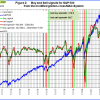 The MAC-US model exited the US stock markets end April 2022.
The MAC-US model exited the US stock markets end April 2022.
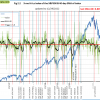 The 3-mo Hi-Lo Index Index of the S&P500 is at +6.88% (last week 7.68%), and is invested in the stock markets since begining December 2022.
The 3-mo Hi-Lo Index Index of the S&P500 is at +6.88% (last week 7.68%), and is invested in the stock markets since begining December 2022.
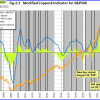 The Coppock indicator for the S&P500 generated a sell signal end July 2022 and is dis-invested in stocks. This indicator is described here.
The Coppock indicator for the S&P500 generated a sell signal end July 2022 and is dis-invested in stocks. This indicator is described here.
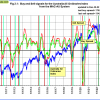 The MAC-AU model generated a buy signal end August 2022, and is invested the Australian stock market.
The MAC-AU model generated a buy signal end August 2022, and is invested the Australian stock market.
This model and its application is described in MAC-Australia: A Moving Average Crossover System for Superannuation Asset Allocations.
Recession:
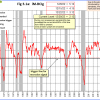 BCIg does not signal a recession yet, however the BCIp signals a recession.
BCIg does not signal a recession yet, however the BCIp signals a recession.
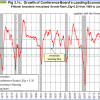 The growth of the Conference Board’s Leading Economic Indicator after the August 18 update signals a recession. The November 18 update of the Leading Economic Indicator is signaling that the US economy is/will be soon in recession.
The growth of the Conference Board’s Leading Economic Indicator after the August 18 update signals a recession. The November 18 update of the Leading Economic Indicator is signaling that the US economy is/will be soon in recession.
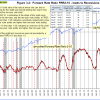 The Forward Rate Ratio between the 2-year and 10-year U.S. Treasury yields (FRR2-10) inverted begining August 2022 and is signalling a recession — the average lead time of this signal is 14 months.
The Forward Rate Ratio between the 2-year and 10-year U.S. Treasury yields (FRR2-10) inverted begining August 2022 and is signalling a recession — the average lead time of this signal is 14 months.
A description of this indicator can be found here.
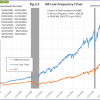 The iM-Low Frequency Timer switched to bonds on 9/26/2020.
The iM-Low Frequency Timer switched to bonds on 9/26/2020.
A description of this indicator can be found here.
